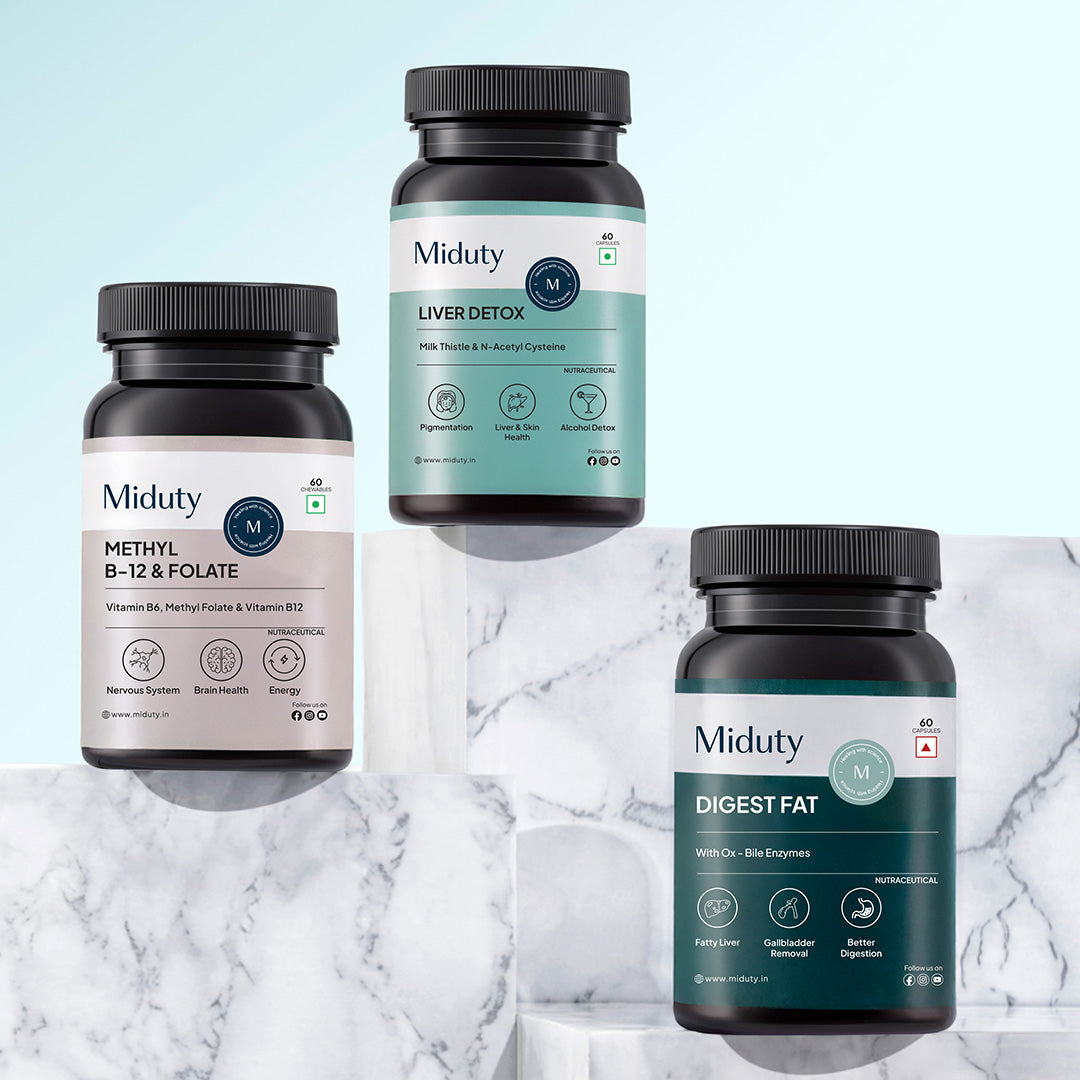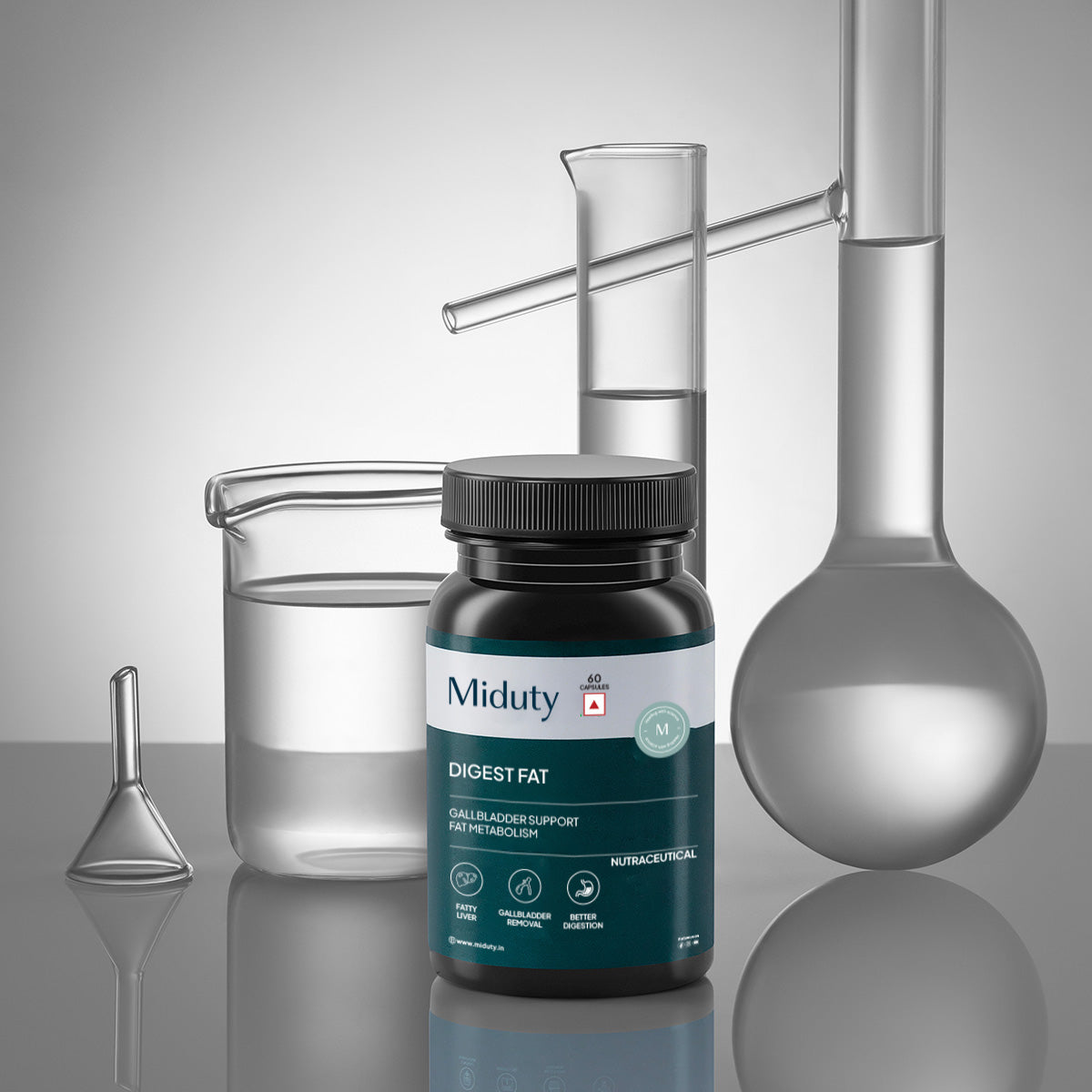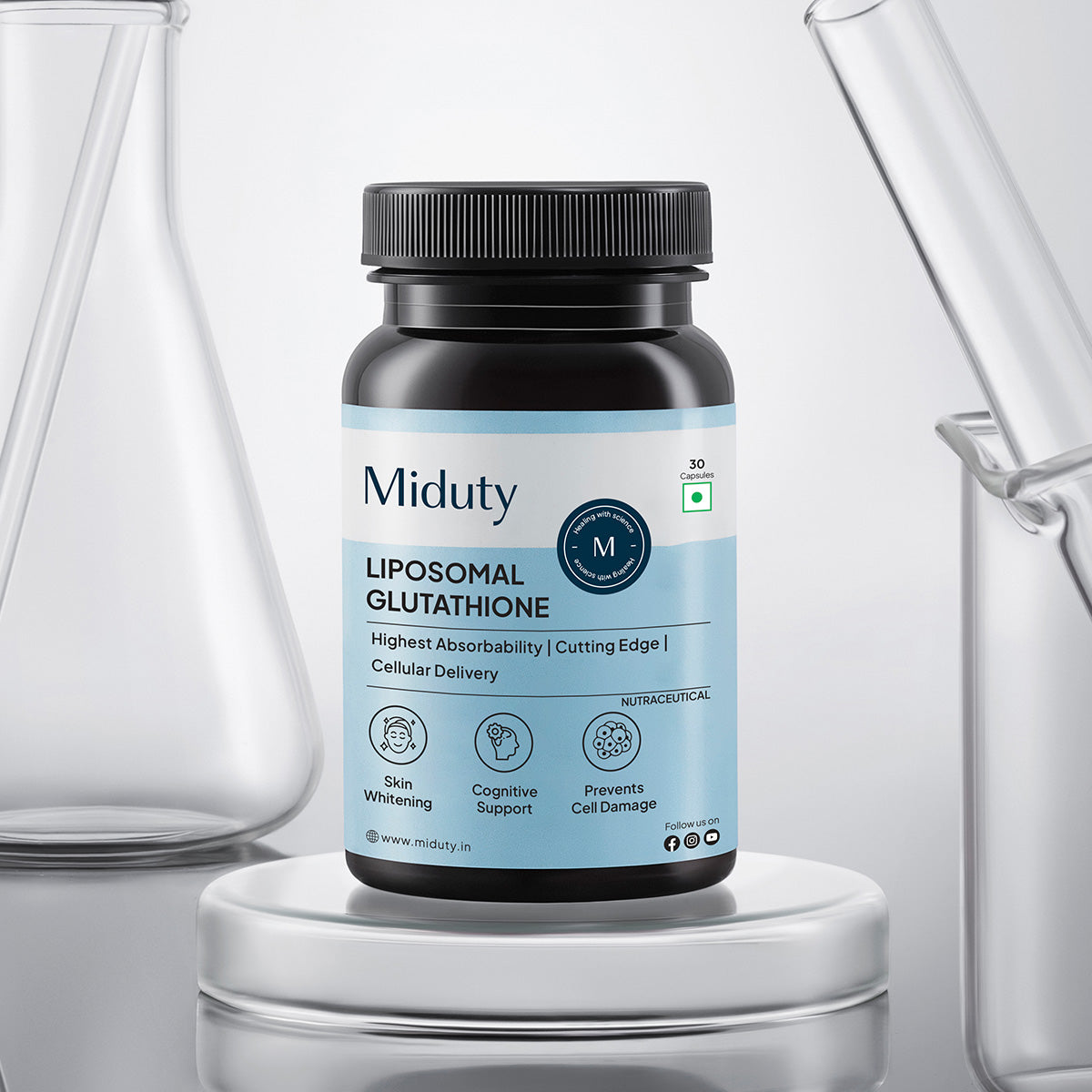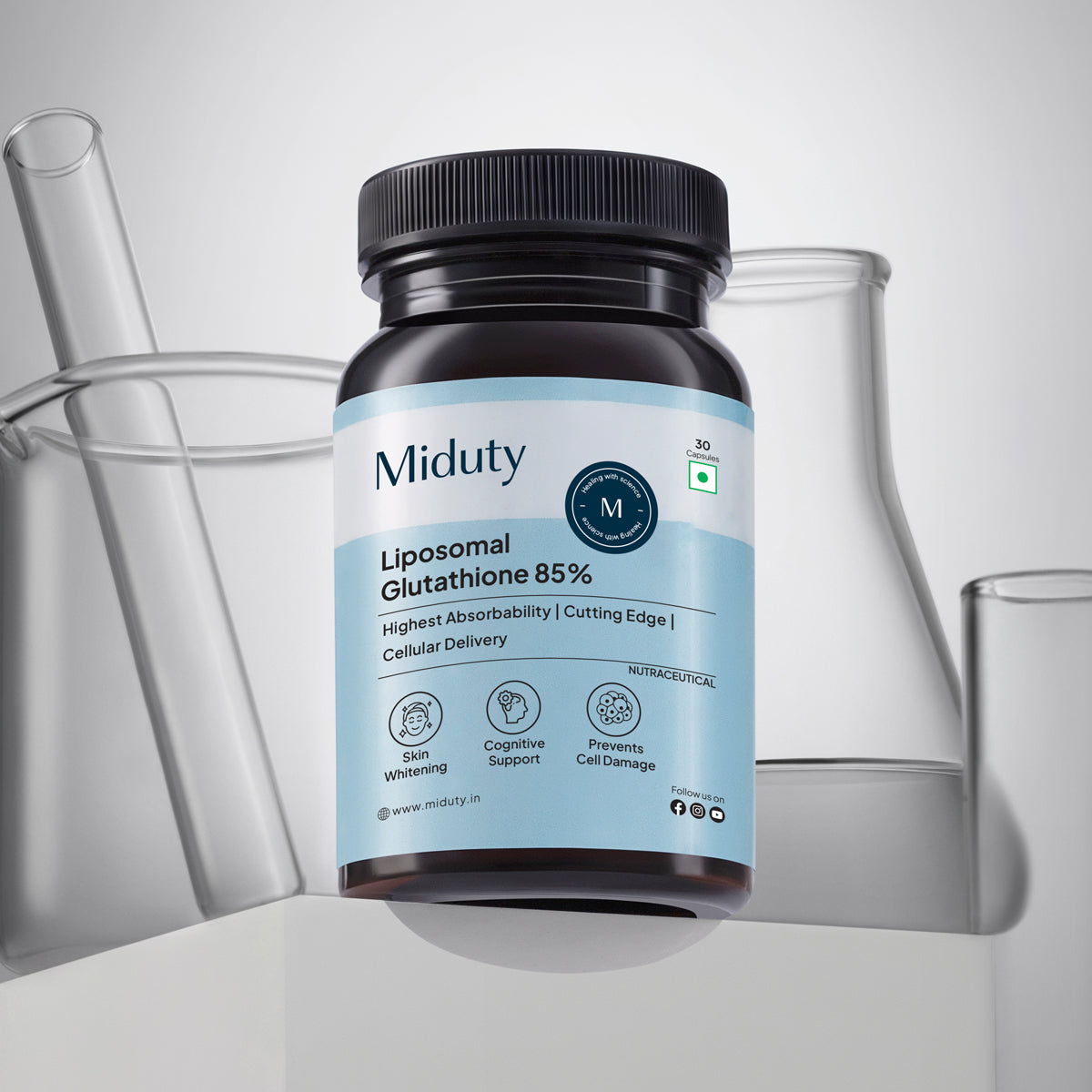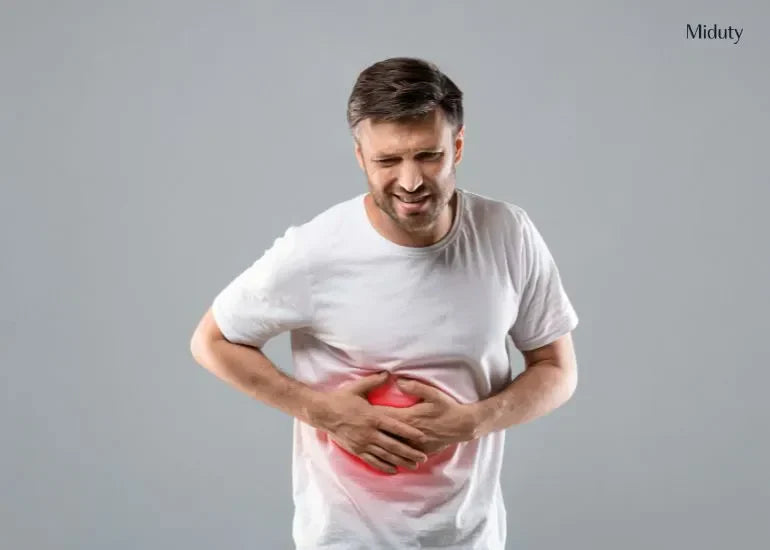
10 Signs Your Liver Needs A Detox
You know the feeling: dragging through the day, waking up with barely any energy despite a full night's sleep, your skin feels off, and every time you finish a heavy meal you feel bloated and uneasy. If this sounds familiar, it might be more than just a rough stretch, it could be a signal from your body's own chemical-processing powerhouse: the liver. The good news? The liver is remarkable at what it does. The challenge? Modern life puts it under enormous strain. And when that happens, subtle whispers turn into louder signals. Let's talk about what those signals might be and what you can do to help your liver recover and thrive.
Key Takeaways
1. Your liver is the body's natural detox powerhouse. It filters toxins, processes nutrients, metabolizes fats, and maintains hormonal balance. When it's under stress, the body begins to show warning signs like fatigue, digestive issues, and skin problems.
2. Persistent symptoms may indicate your liver needs support. Ongoing tiredness, bloating, skin breakouts, yellowing of eyes, or unexplained weight gain can signal liver overload. Recognizing these early signs allows you to take preventive steps before serious damage occurs.
3. Lifestyle choices directly impact liver health. Reducing alcohol, eating clean whole foods, staying hydrated, exercising regularly, and managing stress are crucial to keeping your liver functioning efficiently.
4. Certain supplements can enhance liver function. Ingredients like milk thistle, N-acetyl cysteine (NAC), and dandelion root work synergistically to protect liver cells, support detoxification, and promote bile flow when used alongside a healthy lifestyle.
5. A sustainable approach is more effective than quick fixes. The liver doesn't need extreme "detox" programs, it needs consistent care through nutrition, balanced habits, and, if necessary, high-quality supplements. True liver health comes from long-term support, not temporary cleanses.
What is Liver Detox?
Your liver is one of the most important organs you have. It filters your blood, processes nutrients, metabolizes fats, helps eliminate toxins, makes bile, and plays a role in breaking down hormones and medications. Essentially, it's the body's chemical clean-up and recycling plant.
When people talk about a liver detox, they generally mean supporting the liver so it can perform its job more effectively. This might involve reducing toxin load (alcohol, processed foods, environmental chemicals), improving diet and lifestyle, and sometimes using herbs or supplements that are traditionally thought to aid liver function.
However, it's important to note that the idea that you can flush out toxins in one go or that your liver needs a dramatic cleanse every now and then is not strongly supported by scientific evidence. According to experts at Johns Hopkins Medicine, the term "detox" can be misleading because the liver and kidneys already perform detoxification naturally all the time.
So when we talk about "needs detox," we essentially mean the liver is under stress or working less efficiently, and you want to support it — not perform a magical instant fix.
10 Warning Signs Your Liver Needs A Detox
Here are ten signs that may indicate your liver is struggling, overloaded, or its normal function is getting compromised. If you notice a few of these persistently, it might be time to examine lifestyle, diet, and get medical input.
1. Persistent fatigue and low energy
If you feel tired all the time despite adequate sleep, your liver may be inefficient in processing nutrients or dealing with metabolic load. When toxins accumulate, the liver must work harder to filter the blood, which drains your energy levels and leaves you feeling sluggish and unmotivated. Over time, this chronic tiredness can also affect focus and overall productivity. [1]
2. Unexplained digestive issues
Because the liver helps produce bile (important for digestion, especially fats), you might notice bloating after meals, constipation, diarrhea, or a generally sluggish digestive system. A compromised liver can lead to poor fat absorption, causing discomfort and irregular bowel movements. You might also experience a feeling of heaviness or fullness even after eating small portions. [2]
3. Skin problems
Rashes, dry itchy skin, discoloration, or acne flare-ups may be linked to the liver not clearing toxins effectively or hormonal imbalances due to liver dysfunction. When toxins remain in the bloodstream, the body tries to expel them through the skin, leading to breakouts or irritation. In some cases, dull or uneven skin tone can also reflect sluggish liver activity. [3]
4. Dark or unusually colored urine and pale stools
Changes in urine or stool color can reflect liver or bile duct issues (for example, dark urine from excess bilirubin, pale stools when bile flow is reduced). This indicates that the liver may be struggling to process and eliminate waste efficiently. Persistent changes in color should be evaluated by a doctor to rule out serious conditions like bile duct obstruction or hepatitis.
5. Yellowing of skin or eyes (jaundice)
A more obvious but serious sign. When the liver can't clear bilirubin properly, you might see a yellow tint in your eyes or skin. This typically indicates a buildup of waste in the bloodstream and requires immediate medical attention. It often occurs with other symptoms like dark urine, fatigue, or abdominal pain, signaling significant liver stress.
6. Sudden weight gain or trouble losing weight
The liver plays a key role in fat metabolism. If it's compromised, fat storage might increase, especially around the midsection, or you may not lose weight as expected. Toxin buildup can also slow down your metabolism, making weight management difficult despite a healthy diet and regular exercise. In some cases, this may lead to fatty liver disease if not addressed.
7. Hormonal imbalances
Because the liver helps metabolize hormones, issues might show up as mood swings, irregular periods, low libido, or PMS problems. When hormone clearance slows down, estrogen and other hormones can accumulate, causing unpredictable changes in mood and energy. This can also affect reproductive health and overall emotional balance. [4]
8. Increased sensitivity to alcohol or drugs
If one glass of wine or a smaller dose of medicine than usual causes stronger effects, your liver may be slower in processing these substances. A sluggish liver cannot break down alcohol, caffeine, or medications efficiently, leading to quicker intoxication or side effects. This is often one of the earliest signs that your liver needs support.
9. Easy bruising or bleeding
The liver manufactures clotting factors. If it's weak, clotting may be impaired and you may bruise easily or heal slowly. Even small bumps or scratches might leave noticeable marks. This happens because the liver is unable to produce enough proteins required for blood clotting, increasing the risk of bleeding and delayed recovery.
10. New allergies, chemical sensitivities or brain fog
When the liver is overloaded, you may accumulate more reactive compounds in your body, leading to food sensitivities, sinus problems, foggy thinking or irritability. A congested liver struggles to neutralize allergens and chemicals, which can over-stimulate the immune system. This often manifests as headaches, poor concentration, and a constant feeling of mental "heaviness."
If you recognize several of these, it's wise to consult a healthcare professional, especially for signs like jaundice, pale stools, or dark urine, as these can reflect more serious conditions.
Tips to Support Your Liver (Lifestyle and Diet)
Here are actionable steps you can take to support your liver's health and give it the environment to recover and thrive:
1. Cut back on alcohol and processed foods: Alcohol puts a load on the liver. Processed foods, excess sugars, trans fats, and chemical additives add extra metabolic burden.
2. Eat plenty of whole foods: Vegetables (especially green leafy and cruciferous like broccoli and cabbage), fruits, whole grains, lean protein, and healthy fats (olive oil, nuts, seeds) support overall metabolism and liver health.
3. Include liver-friendly foods: Beets, carrots, garlic, artichoke, dandelion greens, and turmeric are often recommended in traditional systems for liver support.
4. Stay hydrated: Adequate water helps all organs function efficiently, including elimination systems.
5. Maintain a healthy body weight: Reducing visceral fat around the liver helps reduce fat accumulation in the organ, such as in non-alcoholic fatty liver disease.
6. Exercise regularly: Helps improve fat metabolism, insulin sensitivity, and promotes good circulation, all beneficial for liver load.
7. Sleep and manage stress: Poor sleep or chronic stress increase inflammatory load and hormonal disruption, straining the liver indirectly.
8. Avoid unnecessary toxins: Limit exposure to environmental chemicals (cleaning supplies, air fresheners, smoking) and avoid excessive medication or supplement use without oversight.
9. Support digestion and bile flow: Sluggish digestion means toxins linger longer. Include fiber, probiotic foods, and eat in a relaxed state.
10. Get regular check-ups: Especially if you have risk factors like heavy alcohol use, metabolic syndrome, or a history of viral hepatitis. Early liver dysfunction often has no dramatic symptoms.
Supplements for Liver Health
While lifestyle and diet are foundational, many people choose supplements to support liver health. Some commonly used herbs and nutrients include:
1. Milk Thistle (Silybum marianum): A traditional herb thought to protect liver cells and support regeneration.
2. Dandelion Root: Used for its potential to support bile flow and digestion, thereby helping liver elimination.
3. N-Acetyl Cysteine (NAC): A precursor to glutathione (a major antioxidant) that supports detox pathways in the liver.
4. Other herbs/nutrients: Artichoke extract, beetroot, turmeric, alpha-lipoic acid, and choline are also commonly used.
The evidence for these supplements is mixed, especially in healthy people with normal liver function. Some research shows potential benefit, while other studies find little effect.
If you choose a supplement, look for one that has a combination of key herbs and nutrients known to support liver function. For example, a product containing milk thistle plus NAC plus dandelion root may provide broader support—milk thistle for liver protection, NAC for antioxidant support, and dandelion for bile and digestion support. When using a supplement:
- Choose a reputable brand that uses third-party testing.
- Discuss with your doctor, especially if you take medications or have liver disease.
- Follow the recommended dose and monitor for side effects.
- Combine supplements with good lifestyle and diet practices, not as a replacement.
How to Choose the Best Supplement?
When choosing a liver support supplement, look for one that combines well-researched ingredients known to aid liver health. A liver detox supplement containing Milk Thistle, N-acetyl cysteine (NAC), and Dandelion Root is often preferred, as these ingredients work together to protect liver cells, support natural detoxification, and promote healthy bile flow. Milk thistle helps shield the liver from damage, NAC boosts antioxidant levels by increasing glutathione production, and dandelion root aids digestion and toxin elimination. This balanced combination provides comprehensive support for overall liver function when paired with a healthy diet and lifestyle.
Conclusion
Your liver works tirelessly to keep your body balanced and toxin-free. But modern diets, alcohol, processed foods, and stress can wear it down. The signs like fatigue, bloating, skin issues, mood swings, and poor digestion, are your body's way of asking for support. Start by cleaning up your diet, moving more, drinking enough water, reducing alcohol, managing stress, and getting quality sleep. Then, if needed, add a high-quality supplement that combines Milk Thistle, NAC, and Dandelion Root for additional support.
Remember, no supplement can replace healthy habits or medical care. But with consistent lifestyle choices and smart supplementation, your liver can recover, rejuvenate, and help you feel more energetic, clear-headed, and vibrant every day.
FAQ's on Liver Detox Signs -
Q1 - How do I know if my liver is full of toxins?
You may suspect a liver problem if you experience symptoms such as fatigue, yellowing of the skin or eyes (jaundice), dark urine, abdominal pain or swelling, or nausea and vomiting. Other possible warning signs include unexplained weight loss, persistent itching, easy bruising, or confusion. If you notice any of these symptoms, it's important to consult a doctor for proper evaluation and treatment, as they may indicate serious liver damage.
Q2 - What are the four warning signs of a damaged liver?
Four common warning signs of liver damage include jaundice (yellowing of the skin and eyes), persistent fatigue, abdominal pain or swelling, and nausea or vomiting. Additional symptoms may include dark urine, itchy skin, easy bruising, and confusion.
Q3 - What is the biggest indicator of liver disease?
Jaundice, characterized by yellowing of the skin and eyes, is a key sign of liver disease, indicating a buildup of bilirubin—a substance normally processed by the liver. Other major warning signs include abdominal and leg swelling, dark urine, pale stools, and ongoing fatigue. Although early-stage liver disease may not cause noticeable symptoms, these signs often suggest more advanced liver dysfunction.
Q4 - What everyday habits could harm your liver?
Daily habits such as excessive alcohol intake, a diet high in sugar and processed foods, and overuse of certain medications can negatively affect your liver. Other harmful behaviors include leading a sedentary lifestyle, not drinking enough water, smoking, lack of sleep, and chronic stress.
Q5 - How do I know if I need to detox my liver?
You may need to support your liver if you experience ongoing symptoms such as fatigue, digestive problems (like bloating or nausea), yellowing of the skin or eyes (jaundice), dark urine, or unexplained weight gain. These signs may suggest that your liver isn't functioning properly. It's important to consult a doctor for an accurate diagnosis rather than relying on unproven detox remedies.
References
| Sr. No. | Reference Links |
| 1. | Importance of fatigue and its measurement in chronic liver disease |
| 2. | Gut Dysfunction and Non-alcoholic Fatty Liver Disease |
| 3. | Skin Changes in Cirrhosis |
| 4. |




